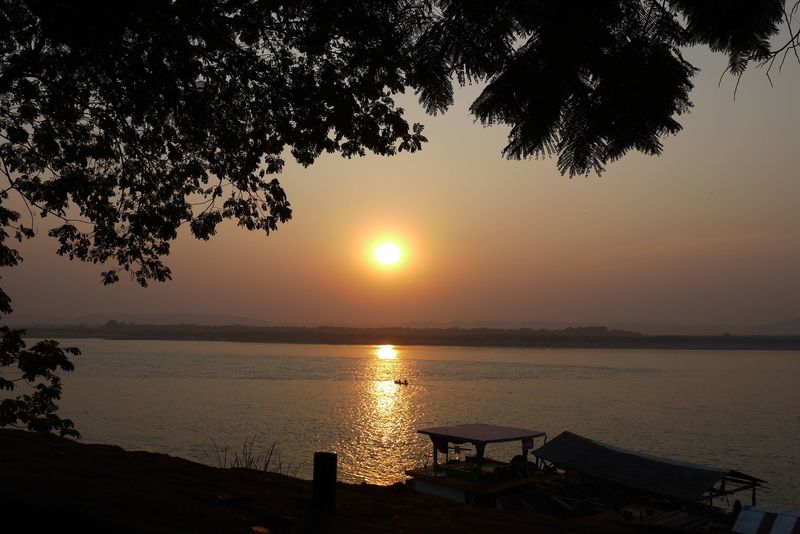
14 Jul The Ugly Side of Emerging Tourism in Burma
Visiting Burma, which was until recently shut off from the outside world and boycotted by tourists, was an eye-opening experience. On the one hand we met some of the loveliest, most welcoming people, many of whom wanted to pose for photos with us and have their children shake our hands. There was also a raw beauty to the places we visited in Burma which shows through in our photos, particularly of the spectacular sunsets and sunrises we witnessed. On the other hand though, we encountered an uglier side of the emerging tourism trade in Burma which led us to question our role as travellers and the damage we can unwittingly cause.
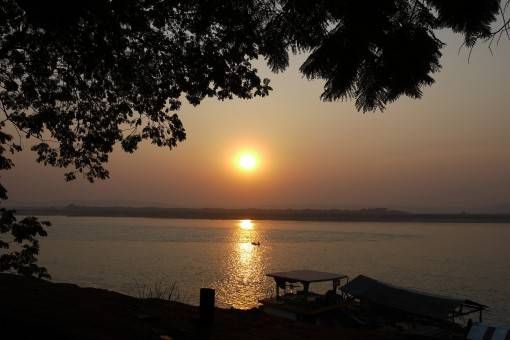
Sunset in Mandalay
There’s a dilemma that we – and I’m sure many other travellers – often struggle with. While we’re constantly searching for ‘authentic’ experiences and long to get to the real heart of a destination, to witness its ‘natural’ state, at the same time the very act of our us being there can sully a place. Tourism is a double-edged sword; while it can bring economic benefits for local communities it can also totally transform a destination – arguably for the worst. Furthermore, while we love to have genuine interaction with people in the countries we visit we have to also accept that many of those people see us merely as opportunities to make money; to some we’re just a necessary evil. So how do you deal with these issues and travel responsibly without leaving a negative impact – is this even possible? We struggled with these dilemmas throughout our trip but particularly in Burma.
Bad Tourism in Burma
On the whole we found Burmese people to be incredibly kind and welcoming, so when Ohan approached us in Bagan we assumed he was another typical friendly local who wanted to chat with us. Ohan told us about his life as a university student in Mandalay, how he was currently visiting his family in Bagan and the sad story of his girlfriend, who recently died in a motorcycle accident. We felt so at ease that we readily agreed to let Ohan show us around the best temples; “For free, so I can practise my English,” he told us.
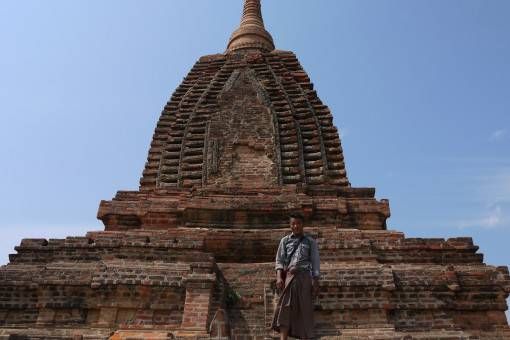
Our ‘free’ guide, Ohan
About half an hour later Ohan pulled some wooden carvings from his backpack and asked us to buy them; it was then that the penny dropped and we realised the entire meeting had been leading up to this sales pitch. Feeling dismayed and awkward we declined the carvings while Ohan got increasingly insistent and agitated with us. In the end, we felt so guilty that we gave him some money as a tip for the tour and to our shock, he then promptly upped and left without so much as a goodbye – that wasn’t the last we saw of him though. Later on that day we spotted Ohan chatting to another pair of tourists; although we were stood just feet away, he completely blanked us. I felt stunned and more than a little bit conned, especially when I realised the story about his dead girlfriend was probably a lie concocted to gain our sympathies.
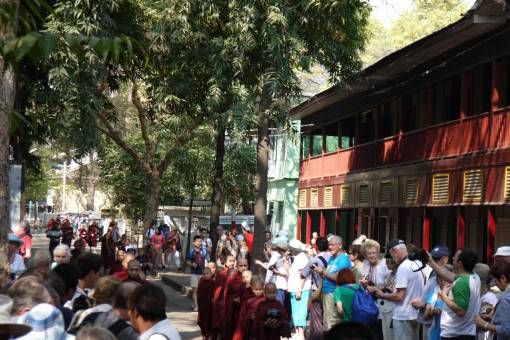
Bad tourism at the monastery in Mandalay
This wasn’t the only time we felt awkward while travelling in Burma. While in Mandalay we hired a taxi to take us out to the surrounding ancient cities, stopping at a famous monastery where hundreds of monks live. At 10am the monks gathered for breakfast, silently queuing while, in a repeat of the daily alms giving fiasco in Luang Prabang, Laos, hundreds of tourists watched while talking loudly, stepping in front of the procession and snapping photos in the monks’ faces. We were ashamed to be part of the crowd and lingered near the back, eager to leave.
Next we visited one of the ancient cities, which is on an island accessed by a short boat ride. As we stood waiting to board we were hounded by children trying to sell us hats and trinkets; this is nothing new and something we encountered regularly in Cambodia, where we made a personal decision never to buy from child sellers on the basis that it only keeps them out on the streets where they’re at their most vulnerable.
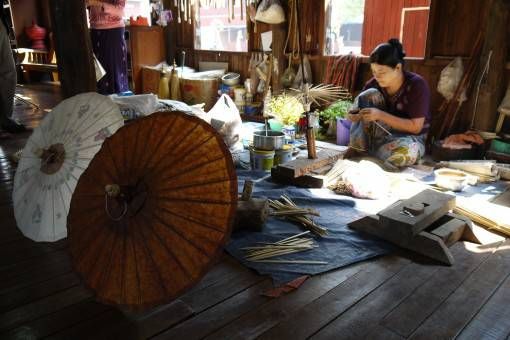
One of the many tourist spots of Lake Inle
When we arrived on the island we were surrounded by people asking us to hire a horse and cart, which is also something we’ve made a decision never to do. The response we got from our refusals shocked us; while some touts aggressively pestered us, others mocked us by cruelly mimicking our polite replies of “No Thankyou”. The episode left a very bad taste in our mouths, especially since we’d experienced such kindness from other Burmese people we’d met.
Are we to Blame?
Looking back on these episodes, I cannot blame these Burmese people for the way they interacted with us. This is the uglier side of the tourism trade that wouldn’t exist if we all stayed away from the country in the first place; so can we really blame people for sometimes seeing us as walking ATMs or for resenting us when we refuse to buy their goods or use their services? Are we ruining the country and its culture by visiting in the first place; should we stay away?
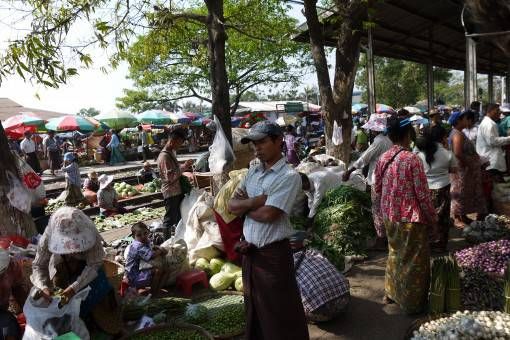
No guides or tourist traps in sight; just a Burmese market
Unlike neighbouring countries such as Thailand, Burma doesn’t yet have a developed tourist infrastructure and visitors are still a bit of a novelty. While most of the people treated us like welcome guests and asked nothing of us, a minority see the emerging tourism trade only as an economic enterprise and they perhaps view tourists as nosy, spoilt westerners (a valid interpretation). Given all that, why shouldn’t the Burmese people take every opportunity to make money from us, especially when there are still so many political problems in the country and so much widespread poverty, corruption and oppression?
There was another dimension to these issues for us; the fact that Burma was colonised by the British. We couldn’t help but feel residual guilt because of this, especially when reading George Orwell’s Burmese Days while travelling through the country. Time and again many of the people we met asked us about our lives back in England and our previous jobs – all told us how lucky we were and how they’d love to have the opportunities we have. These conversations were sobering and reminded us of how randomly lucky we are to have been born in the UK.
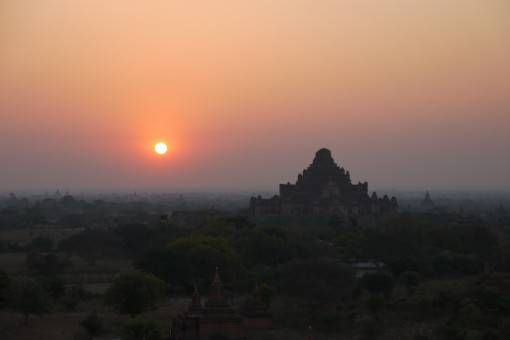
Despite the problems we had Burma is a truly beautiful country
These issues exist to some extent in all of the Asian countries we’ve visited but because tourism is relatively new there, we found them most starkly visible in Burma. There are no easy answers or resolutions to the problems I’ve mentioned but we’ll no doubt continue facing them the more we travel.
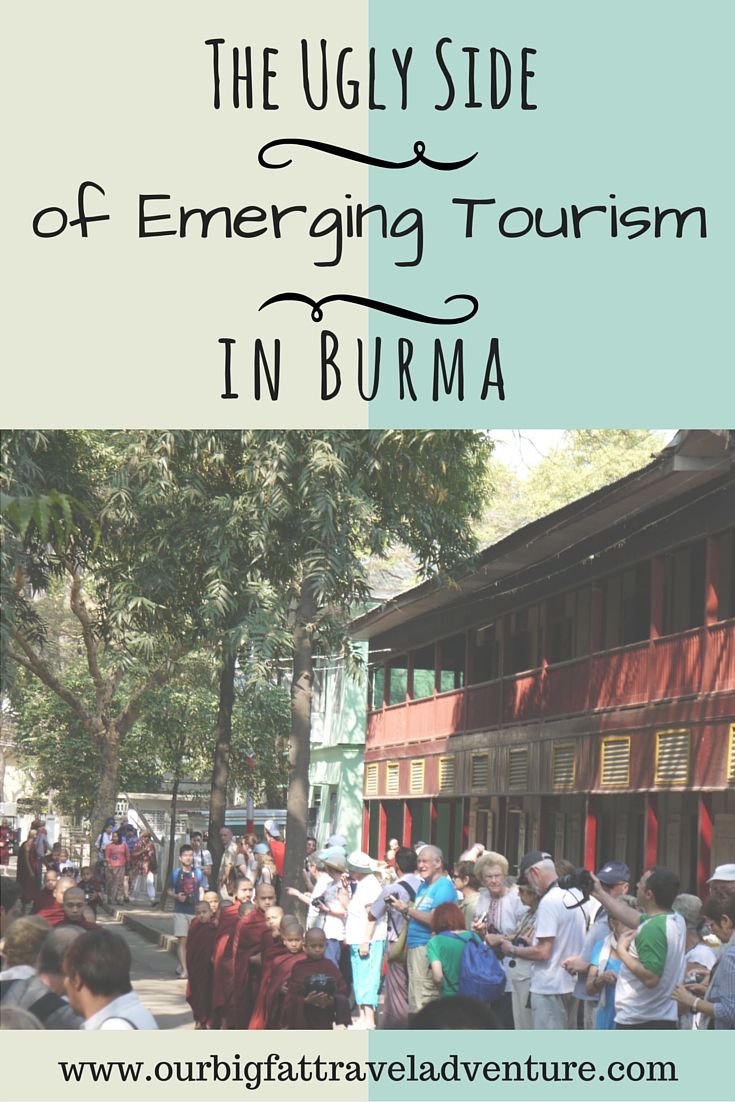
Pin Me!
How do you deal with the issues surrounding the ugly side of tourism?





Steph (@ 20 Years Hence)
Posted at 16:01h, 15 JulyI’m sorry to hear about these negative experiences you had while in Burma, though I have to admit they aren’t the first reports I’ve read since the country opened up. As you say, it’s not an issue that is unique to the country as no matter where you go in Asia, locals will likely consider white Westerners to be rich, but it is true that some countries are more aggressive than others when it comes to pursuing tourist dollars (we found this to be true in Cambodia, personally). It’s all the more difficult to deal with when you have been otherwise impressed by the kindness of the locals and it’s hard not to let some bad apples spoil the bunch. It’s stories such as these (paired with the sometimes insane hotel prices) that made me hold off on visiting Burma on this trip… it’s a country I would love to visit one day, but I think I would enjoy a visit more once some of the issues they have are ironed out.
Amy
Posted at 10:41h, 16 JulyI thought your experiences in Cambodia sounded similar to ours in Burma Steph. It is a shame because most of the people in Burma are lovely but we became a lot more guarded after the Ohan incident; Burma is the country I felt most ‘tourist guilt’ in.
Tyler
Posted at 03:56h, 16 JulyGreat post highlighting the important ethical dilemma surrounding the surge in tourism in Myanmar. For us, we did our best to ignore these situations or, when impossible, try and change the topic quickly. Being low season when we visited, few vendors expected to make a sale, so they were happy to instead talk about their lives or favorite fruit or what-have-you. I imagine during high season it would have been much more difficult to explore the temples without constant selling harassment.
You’re right that these negative interactions you highlighted are a result of visitors arriving in country – there would be no hordes of sand-painting vendors flocking the pagodas of Bagan without the expectation of someone coming who’s willing to pay for it. But, on the other hand, what would they do to make money if there weren’t tourists to buy things? I haven’t a clue, but tourism may be the exact opportunity they need to build a better life for themselves.
In the end, I’d like to think we’re having a positive effect. The Burmese are now seeing and meeting people who have experienced greater freedoms and have had more opportunities in life and I hope it gives them motivation to work harder for the changes that are already happening there. A naive sentiment, but one I’ll hold onto for now while I watch to see how the country changes in the near future.
Oh, and I’ve never felt so uncomfortable as a traveler as when we were at the procession of monks near Mandalay. I was flabbergasted at how people were acting and I was ashamed to be there. It could have been such a magical moment but for how some tourists acted.
Amy
Posted at 10:47h, 16 JulyHi Tyler, thanks so much for your comment. I like your positive view and I don’t think it’s naive, after being shut off for so long I’m sure the Burmese people are learning more from tourists then just how to extract dollars from them. I’m glad we’re not the only ones who felt the monk procession was awkward – I was truly ashamed by the behaviour of many of the tourists we saw there; I think the monks put up with it for the tourist donations.
Erin
Posted at 21:05h, 22 JulySorry about your run in with the scammer. We had a similar episode in Thailand, but had been prewarned. Still the story was so sincere… They should get jobs in Hollywood!
Amy
Posted at 08:29h, 23 JulyI know Erin, Ohan was such a good actor and I felt most annoyed that he lied about his girlfriend dying. We had been so disarmed by the kind people we met in Burma that we were totally thrown by this experience.
Heidi Wagoner
Posted at 07:51h, 23 JulyAmy I always love you articles. This really is a catch 22 and we have experienced the same. Many years ago, I went way off the beaten path in Guatemala and it was the same. It really pulls at your heart strings to see the kids selling, begging and to not help. You are right though, it does just feed the cycle and keep them there. Oh it is so difficult. We will be in Southeast Asia in a couple of days, so we appreciate your info to help keep us aware as we travel.
Amy
Posted at 08:33h, 23 JulyThanks Heidi 🙂 It is so difficult, it sounds like we’ll come up against the same challenges when we get to central and south America too then. I hope you guys have fun in Asia, I’m looking forward to seeing where you go and how you find it after so long in Europe. We will be in Hanoi, Vietnam from late August till next May working so be sure to look us up if you get there 🙂
Alyson
Posted at 13:15h, 23 JulyThe Luang Prabang pantomime really upset me, some people! But you can’t blame the locals for trying to make a buck. It’s life.
Amy
Posted at 18:51h, 23 JulyExactly Alyson, it’s hard to blame the locals for wanting to make money – it’s a difficult situation. I just wish Ohan had been more honest about the fact that he was trying to sell us something from the get-go.
Victoria
Posted at 00:11h, 24 JulyIt’s a sad story for all concerned Amy and it’s not confined to hair or eye colour. Of course, I understand and am sensitive, to income disparity level in developing or under-developed countries, but when I first started travelling oh, so many years ago. And solo.
As soon as the locals found out that I was British, they changed towards me and started harrassing me for money. I love Bali but it was in Bali that I was shocked to have pimps come to my restaurant table asking whether I wanted a boyfriend! I mean. What??!!
If I’m with my husband and son, I tell people the truth about myself but if I’m travelling abroad alone, I tell the locals that I’m German. For some reason, they then leave me alone!!
Amy
Posted at 09:12h, 24 JulyThat’s really interesting Victoria I wonder why being German would make a difference to them! It’s really shocking that you were approached by pimps too, how awful!
Peter Korchnak @ Where Is Your Toothbrush?
Posted at 18:31h, 25 JulyHow to deal with the ugly side of tourism? Think of it not as ugly but just a fact of the traveling life. My way of dealing with touts, hustlers, panhandlers, scammers, and their ilk while traveling is threefold:
1) think of them as part of the experience;
2) include them in the “cost” of travel, in the same vein as jet lag, language barrier, and digestive ailments; and
3) remember that I and travelers like me are the reason they exist.
On the ground, I follow my mom’s rule and don’t talk to strangers. I also say, “No, thank you” in English and, if necessary, in the local language. And I since I started using the wagging index finger method, approaches by wily locals dropped like coins into a monk’s alms bowl.
Similar to Victoria, I do find that when I say I’m from the United States, where I live and am a citizen, I get much more unwanted attention than when I say I’m from Slovakia, where I was born/raised/educated. Speaking Slovak back at people trying to sell me things also helps…
Amy
Posted at 21:53h, 25 JulyGood advice Peter, thanks for commenting; interesting that you get hassled more when saying you’re from the US. I really struggled with this in Burma as the people were generally so lovely so it was hard when one or two turned out to be conning us – I think it was the lie about the dead girlfriend (if it was a lie) that really got me. You live, you learn though I suppose and this is something we have to learn to deal with if we want to travel.
Stefan Arestis
Posted at 17:38h, 14 DecemberI was initially shocked to hear this, but after travelling around other south Asian countries, particularly India, everything you said above happens in India plus more.
It’s bad because it turns you into this hard nosed bastard tourist who instantly reacts defensively to any encounter from a local (as you know that the conversation will inevitably lead to money / tip / myfriendmyfriendcometomyshop).
Sad about the tourists and the monks though.
We’ve just started planning our trip to Burma in Jan.
Amy
Posted at 03:39h, 15 DecemberTrue Stefan, it’s horrible to become wary of locals, especially in places like Burma where most of the people we met were extremely lovely. I’m sure having been to India you guys will be well prepared for Burma and I’d definitely recommend getting off the main tourist route a bit if you can; I wish we’d done that. Have a great trip!
Stefan Arestis
Posted at 18:16h, 15 DecemberThanks. We’re currently now trying to decide on 2 weeks or 3… We have to decide tomorrow as we fly to BKK tomorrow evening and want to have our flight out in mid Jan for the visa on arrival (just in case they ask for it).
Amy
Posted at 12:23h, 16 DecemberTough decisions! I think it depends on how many places you want to visit; take out a few days to allow for travel too. I think three weeks was a good amount of time for us but I think we could have fitted in a fifth destination within that time and also spent a couple of days hiking from Kalaw to Inle.
Alyson
Posted at 17:22h, 03 AugustAnd here I am again re-visting this post. Maybe, just maybe, Burma in late September.
Amy
Posted at 16:24h, 05 AugustSounds like a good idea! Burma wasn’t our favourite country by a long shot but I’m glad we went to see it for ourselves and we met some really lovely people.